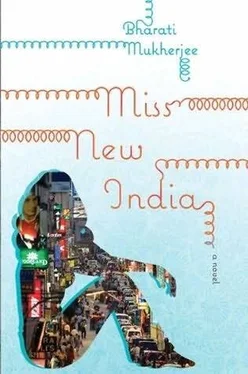Asoke presented the refreshments to the officer before answering, at length and with extravagant hand gestures, the questions the officer snapped at him. Anjali couldn't understand a word of their speech, it being in Kannada. And wasn't that mousy little Sunita Sampath, suddenly resurfaced, helping to serve the food and drinks, talking to the police, and occasionally pointing up to the bathroom? Soon after he had finished interviewing Asoke, the officer sent his three constables back into the house. They returned with a long file of women in their midteens and midtwenties, taken from among the looters and squatters. The girls who had emptied the pantry shelves and sneered at Minnie's hoard of Marmite were at the head of the sullen file. Why weren't the men lined up when their plundering was so spectacularly brazen? "Hi, Girish, it's me again with an SOS!"
The interrogations had gotten well under way before she gave up on Mr. GG, opened the window, and yelled down to the seated officer in English, "Mrs. Bagehot's here! Heart attack!"
"That's her!" An agitated shout from Asoke, this time in English. He pointed at the window. "That's the tenant! There she is!" And Sunita stared as well, smiling but not bothering to point.
Before Anjali could duck, an angry woman, the first to be interrogated, scooped up a fistful of pebbles and flung it at the bathroom window. She inspired her friends. Some squatter men joined in, hurling chunks of concrete loosened from the front wall and broken bricks from the edges of wilted flowerbeds. The window grille, originally installed to deter burglars, repelled the large projectiles. Why had they suddenly turned on her? Anjali's distrust of the police softened into gratitude. Their duty was to protect her; they had no choice. She backed away from the window, crouched on the tiled floor, inches from Minnie's body, and prayed for rescue. When the officer, with a policewoman and two male constables in tow, finally burst through the bathroom door, that's how they found her. Asoke sidled in after them. He didn't shriek or wail at the grotesque sight. Instead, while the policewomen pulled Anjali to her feet and handcuffed her, he covered the naked corpse with the only bath towel, still damp from use, hanging on the towel rack, a servant's small gesture of gallantry.
"You are paying guest of this lady?" the officer demanded, and pointed his baton at Minnie's body. He had the sagging, full lower lip of a heavy smoker and sprayed saliva as he spoke. With her hands cuffed, she couldn't blot; she could only watch patches of spittle land on her silk clothing and spread. Like a Bollywood cop, the man wore oversize, mirrored sunglasses, like a mask, but the accusatory growl in his voice made her feel like a criminal. She'd already been judged. "Please to describe your relationship to the deceased."
"She was dead when I got here," Anjali blurted. "I don't know why all this craziness is happening."
"Please to make response only to question posed." The officer ordered a policewoman to confiscate Anjali's pocketbook, watch and cell phone before continuing his interrogation. "What is nature of connection you are having with deceased aged lady?"
"I had nothing to do with any of this. She must have died of shock. I wasn't here. Goondahs were breaking into her home and stealing all her property."
"You are putting my patience in jeopardy." The officer extracted a pack of cigarettes from one of his many pockets but didn't light up. "I'm asking one more time only. You are residing as tenant in the deceased's lodging, but owing rent money?"
She lowered her gaze from the officer's plump, moist lower lip to his heavy khaki socks and brown ankle boots.
"Yes or no?"
She said nothing. Why would the officer believe that the dead landlady had offered to run a tab for this handcuffed tenant?
"Your good name please?"
"Angie. Anjali Bose." It conferred no identity. She didn't own the name. She could have been anybody.
"Your name is Anjali Bose? Why your purse is saying HS?" He was pointing to the gilt letters on the leather strap.
"I don't know." She lied.
He made a dismissive gesture, a sweeping of his hand, and the two policewomen dragged her down the stairs, across the foyer, down the porch steps cluttered with Bagehot furniture, past the single-minded auction-house representative in the sky-blue suit and the screaming mob and into a police cruiser. Her foot crunched the photo of dead Sikhs, which lay on the ground, stripped of its pewter frame, something new for the trash bin of history. There was no paddy wagon in the police convoy. There was no convoy.
So long as she'd been in Bagehot House, Anjali had felt in control. Surely there was someone around to vouch for her, a Tookie to say "Hi, girlfriend." She was a Bagehot Girl, after all, but in the back of the police car, handcuffed to a grille behind the driver's seat, she realized there was no one in the world she could reach who knew who the hell she was.
In an interview room in the Central Bangalore Police Station, as she sat across a table from a square-jawed, sari-clad policewoman, waiting to be interrogated by a senior detective, Anjali Bose finally broke down. On the ride to the station in the police cruiser, she had acted composed, almost cocky, demanding to know the charges against her. But in that small windowless room, guarded by two uniformed women, one of them about her mother's age, she started to cry, and in crying, started great body-shaking heaves. There were no actual charges, hence nothing to defend herself against. She was being accused of who she was, not what she'd done. The policewoman was someone's wife, since she was wearing a mangalsutra wedding necklace, and probably someone's mother. But in her midriff-covering, four-button khaki-cotton regulation blouse and khaki teri-cotton regulation sari secured on the left shoulder with an Indian Police Service metal badge, she looked merely brutal.
The younger policewoman threatened in broken English to shut Anjali up with "tight slaps." She had a thin, mean face, a stout, muscular body squeezed into a khaki shirt and unpleated khaki pants, and huge, wide feet, judging from the size of her Derby brown leather shoes. Anjali feared the woman was itching to carry out her threat, but she couldn't choke back her dry heaves and grunts, not even when she heard the squeaky leather shoes stride across the room toward her. She steeled herself for the blows. What the policewoman did instead was grab her shoulders in a hold painful enough to make her shriek. Pleased, the policewoman relaxed her grip, thrust her fist down the back of Anjali's kameez, and pulled up its designer label. "Dubai," she sneered. Then in Kannada she launched into what sounded like mocking insults.
She recognized what had unleashed their taunts: her expensive silk salwar-kameez. It didn't seem to matter to her guards that her clothes were wrinkled and sweat-stained from day-long stress. In one day, that day, she had flunked out of CCI, witnessed mob fury, been accused of murder, and hauled off in handcuffs. She read her guards' minds: How did an unemployed working girl afford such a fancy wardrobe? Drugs? Who but loose women flaunt their bosoms and hips in tight, attentiongetting clothes? Whores! She sat as still as she could while the excitable younger policewoman patted her down with palms that felt as large, flat, and hard as Ping-Pong paddles, first up and down the length and width of the back, then over the front. Thick fingers pressed into her collarbone, swatted her breasts, rested on her nipples, and flicked them as though turning light switches off and on and off and on, flic\-flic\, and when they hardened, both policewomen burst into giggles. Without her cell phone, Anjali felt totally cut off. No one knew what was happening to her. Worse, no one would care that she had disappeared. They would assume that she had raced into new adventures. Helpless, hopeless, she prayed for the detective to enter the interview room. He would admit that the police had made a mistake-or a mistake had been made-and let her go. But where could she go when freed? She had no Bagehot House to shelter her, no mother and sister to console her, no lover to embrace her.
Читать дальше












